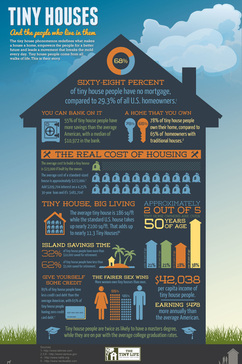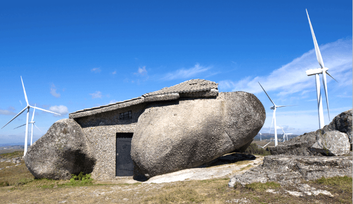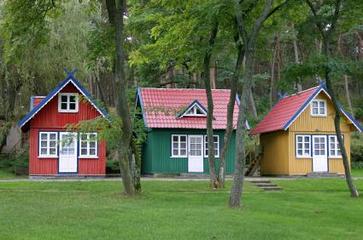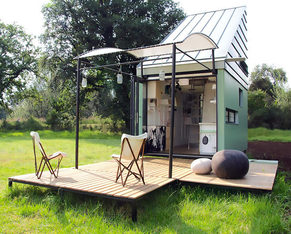 from tinylife.com from tinylife.com Could you live in a bus? A shipping container? An old trailer? A garage? A tree? A grain silo? The tiny house movement has people across the world opting to move out of their three and four bedroom family homes and into any of the above. But what exactly makes a “tiny home” a tiny home? According to thetinylife.com the tiny house movement is “a social movement where people are choosing to downsize the space they live in.” More specifically people are downsizing from homes that average 2,600 feet to homes between 100 and 400 square feet. Why are people opting to downsize? Well, it depends on the person, some people move into a tiny home for economic reasons, some for the pure adventure, some opt for a tiny home to decrease their reliance on material positions, some for environmental reasons or for any combination of these reasons. So what does a tiny home have to do with climate change? Tiny homes have the potenital to significantly reduce a person, or families carbon footprint. A carbon footprint, also referred to as an ecological footprint, refers to how much carbon (or more generally greenhouse gas) a person is contributing to the atmosphere. Tiny homes can reduce this footprint in a few ways. Not only will the house itself require less energy to power (less space to heat and cool, less rooms to light up, less space for multiple TVs and other electric appliances), there is also less room for the accumulation of stuff. The less stuff a person buys, the smaller their carbon footprint will be. The house itself also requires less material to build.  Stonehouse from tinyhousedesign.com Stonehouse from tinyhousedesign.com However, it is also important to realize, while some people take old buses, or shipping containers to build their dream tiny home, many people purchase all new materials. Yes, there is no doubt that the carbon footprint of building a 100-400 square foot home is smaller than building your 3000 square foot dream home. But, one should still consider whether the building of a tiny home from new materials, likely having to custom make/buy appliances and furniture to fit the small space, and the gas used if your tiny home is mobile, is better or worse for the environment than buying a home that has been in existence for years. And what happens if you live in a tiny home for a year and decide it's not for you, what happens to the home? Do you now need to buy all new appliances and furniture for your new "normal size" home since you likely got rid of your old home furnishings when you moved into the tiny house? Living in a tiny house can sound romantic, but many people run into zoning problems, don't have space to entertain guests, run out of space as their family grows, begin to feel lonely in their secluded location, among other problems. While tiny houses definitely have the potential to reduce a person or families carbon footprint, and in turn help mitigate climate change, moving into a tiny house it not something to be taken lightly. It is fun to browse through the endless images on the internet of tiny homes, and the transformations people have made (and distracted me from doing my grad school work for a solid hour while I was searching for images for this post), there are A LOT of factors to consider before making the transition, and before one claims it's the most sustainable way to live! sources and more information- http://thetinylife.com/what-is-the-tiny-house-movement/ http://www.techinsider.io/five-people-who-abandoned-their-tiny-homes-2015-7 http://www.hgtv.com/remodel/interior-remodel/10-extreme-tiny-homes-pictures
2 Comments
Hope
18/11/2015 03:29:20 pm
I love the idea of these tiny houses! They are perfect for young adults looking to reduce their carbon footprint. It's not quite as cheap as renting an apartment, however if someone is looking to ditch the apartment scene and live in solitude, this is a great idea! I can see myself doing this before having a family.
Reply
Cassi
29/1/2016 06:49:34 am
Its great for a couple not planning to have kids or people who want to move around and not be tied so strongly to one location. The amount of energy to heat a tiny home is such a tiny fraction of that of a normal sized house it's ridiculous. A lot of people hate renting (myself being one of them) because you spend SOO much in rent for a place that even after 50 years, is never actually yours. You lose so much money to use a space vs. having something of your own that you can keep as long as you want with minimal cost and possibly little to no rental cost.
Reply
Leave a Reply. |
Categories
All
Archives
March 2024
|


 RSS Feed
RSS Feed
